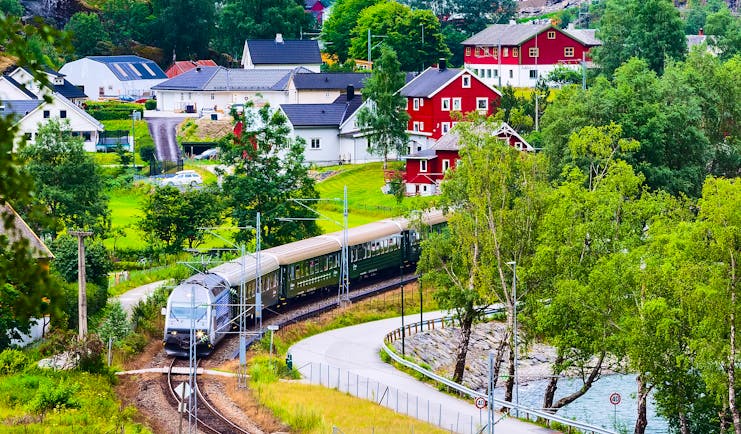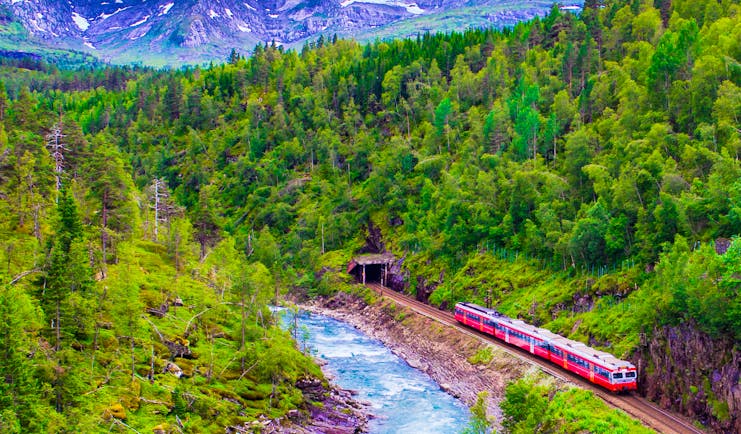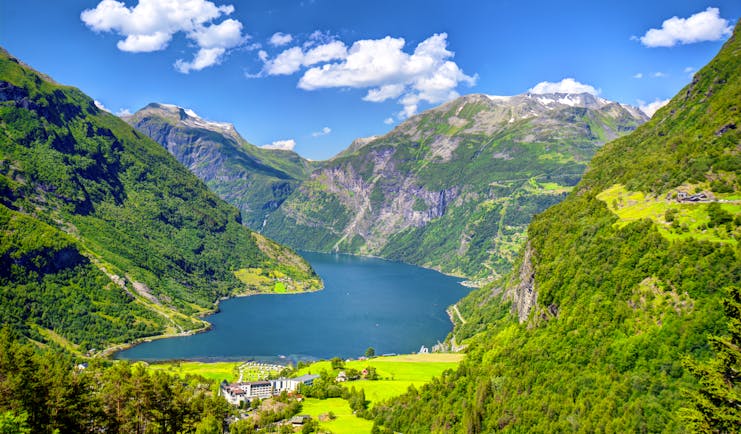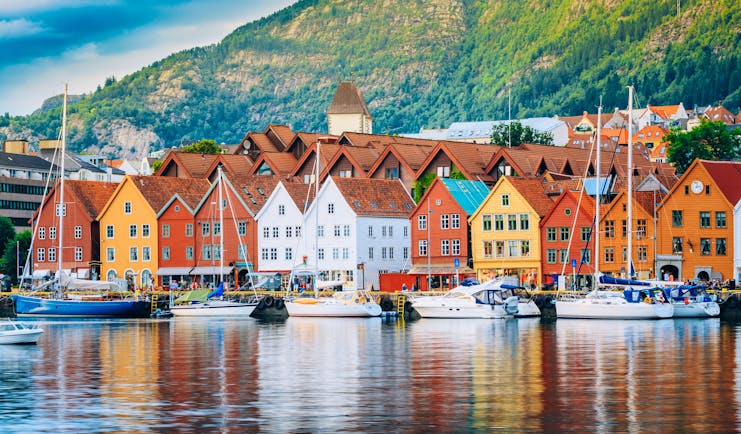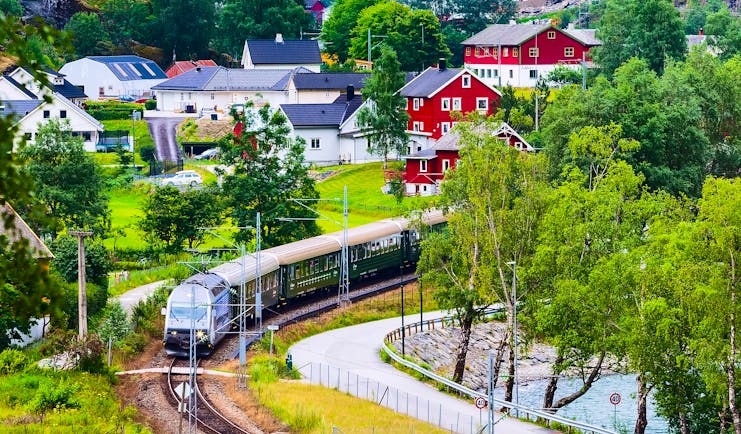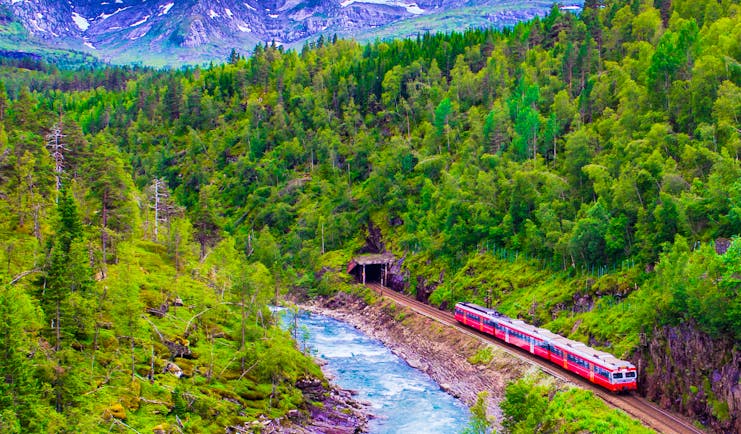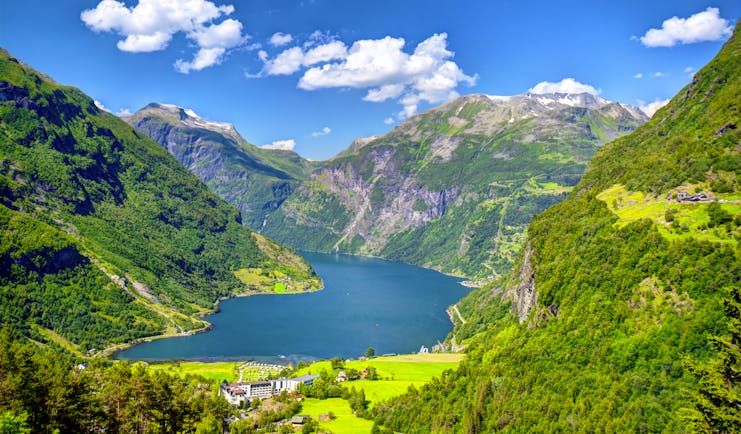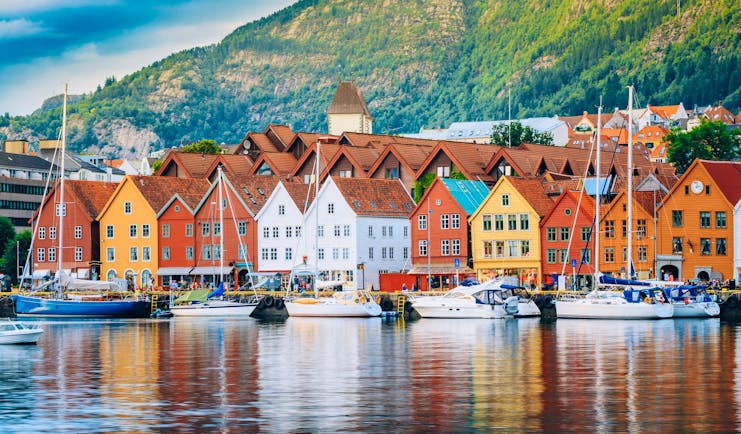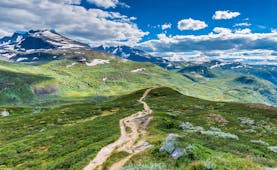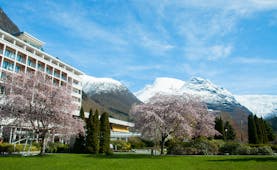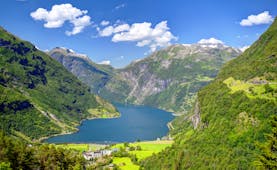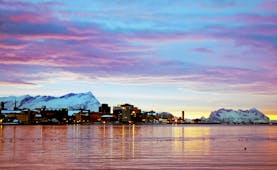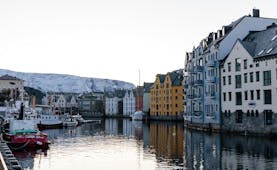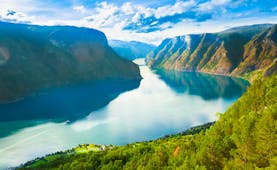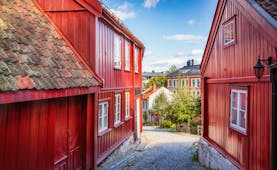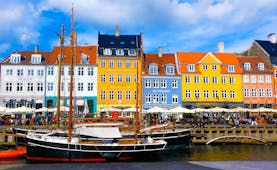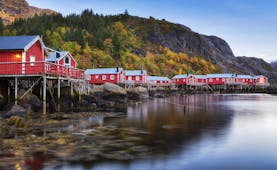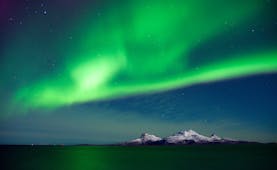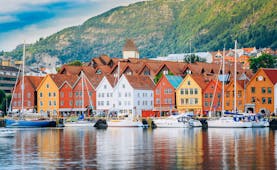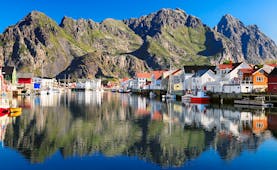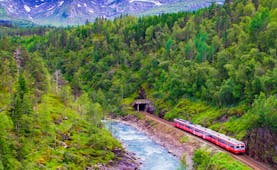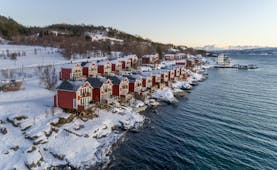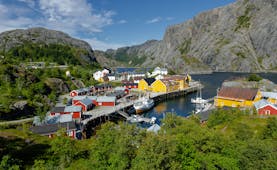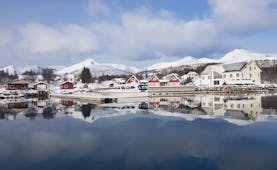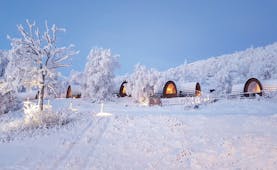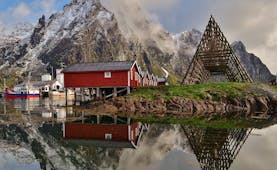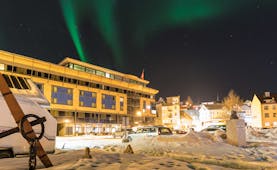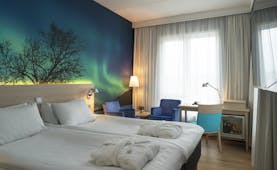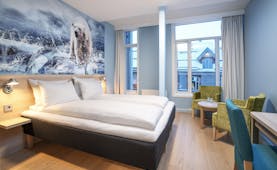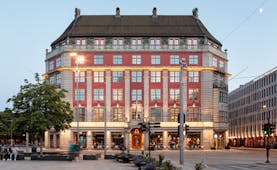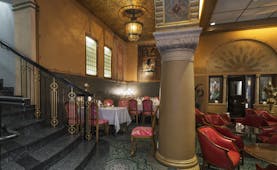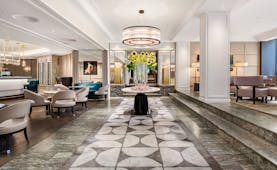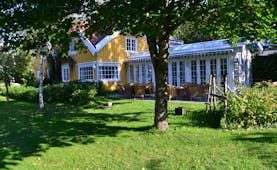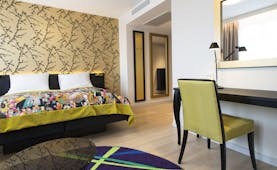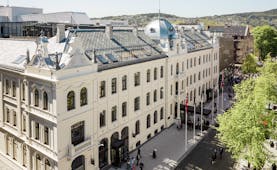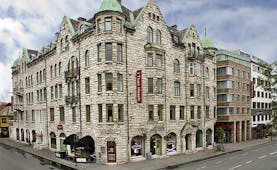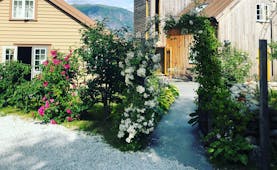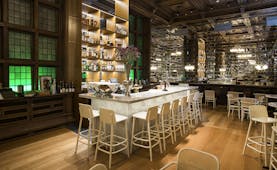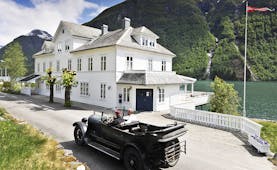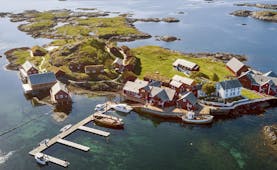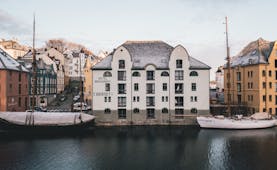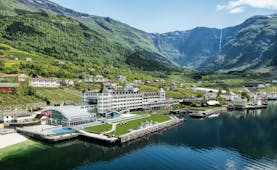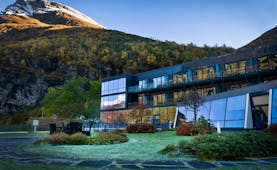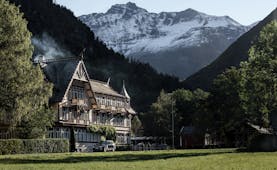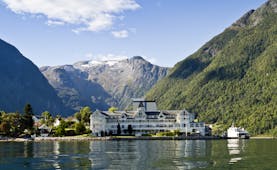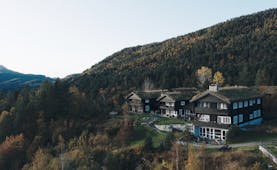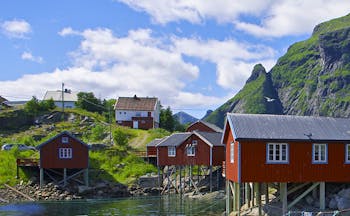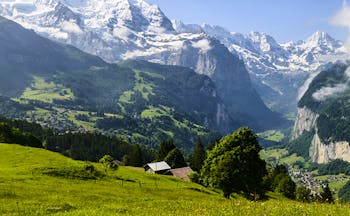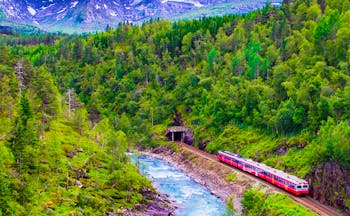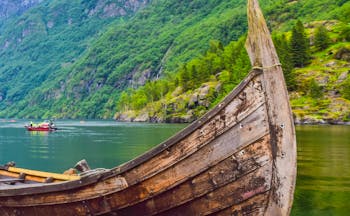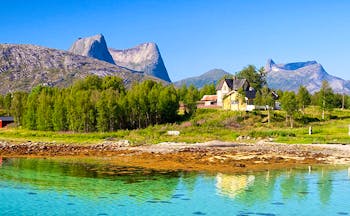Luxury Norway grand rail tour 14 nights including scenic rail journeys
This 14-night holiday of Norway incorporates the major scenic railway journeys of the country and gives you a real flavour of some of the most fascinating cities and fjords in between. Start with a stay in Bergen, known for the colourful façade of Bryggen with its picturesque wooden structures, now recognised as a UNESCO World Heritage site. For those more interested in the cultural attractions the Troldhaugen was the home of composer Edvard Grieg and houses a museum and a concert hall where his music is still played. Then take the railway to Myrdal where you transfer to the Flåm railway, one of the steepest standard gauge lines in the world. Time to take a boat trip from Flam on the Sognefjord before continuing back on the Flåmsbana and on to Oslo for three nights. For a deep insight into Scandinavian history a visit to the Bygdøy Peninsula is essential: this area is home to five national museums including the Viking Ship Museum and the Norwegian Folk Museum. Each of these is well worth a visit, and the rest of the peninsula is a haven for nature lovers. The Akershus Fortress is another famous landmark- completed in the 1300s, this castle had a strategic location at the very end of the headland and is today open for guided tours. Perhaps the most enchanting of Oslo’s open spaces is the Frogner Park, home to the Vigeland Sculpture Park which features more than 200 sculptures and is one of the country’s top tourist attractions.From here travel north on the Dovre line changing in Dombas for the Rauma line. This route passes through the Romsdalen valley and passes sites such as the Kylling Bridge and the Trollvegen wall, as well as going through the remote Reinheimen National Park. The track has 32 bridges and six tunnels. Stay in Andalsnes, known as the mountaineering capital of Norway. Continue on the Dovre line to Trondheim, ancient capital of Norway. Located on the Trondheimfjord and the third largest city in Norway, Trondheim is home to the world’s northernmost mediaeval cathedral, the Nidaros Cathedral. Formerly the site where Norwegian kings were crowned, it is today open to tourists. You may want to spend some of your time in Trondheim exploring the picturesque streets of Bakklandet, a small neighbourhood of painted wooden warehouses. For an excellent view of Trondheim and the fjord you can climb to the top of the Tyholttarnet, the tallest building in Norway. From here you can take a day trip on the Roros line to the UNESCO site of Roros, a traditional mountain village and ancient mining town. You leave Trondheim on the Nordland railway, also known as the Polar Express, a journey of 10 hours which crosses the Saltfjellet mountain range to reach Bodo. Return by air via Oslo.
Highlights
Bergen • Flåm railway • Sognefjord • Oslo • Dovre railway • Rauma Line • Roros by train • Trondheim • Nordland railway • Bodo
Day by day
Fly into Bergen and check-in to your hotel.
Bergen is the second largest city in Norway and was the capital throughout some of the country’s most influential periods. One of your days here should start with a visit to the iconic Bryggen wharf, first established in the 14th century and a UNESCO World Heritage Site. Its colourful buildings today house a small museum, shops and restaurants. Bergen is known as the city of the seven mountains, the most easily accessible of which is Fløyen, which can be reached by funicular from the city centre and awards spectacular views of the city and surrounding area. It is possible to take the funicular back, or you may want to hike back down at your leisure. To fully appreciate the culture and traditions of Bergen, you should take the time to visit the Bergen Fish Market. Bergen has the busiest seaport in the country and the market offers an abundance of fish, shellfish, fruit and vegetables. Cultural attractions include the Troldhaugen, the former home of Edvard Grieg and today host to a museum about his life and works as well as a concert hall where you can hear his music performed. Its location in the fjords also makes Bergen an excellent base from which to explore more by boat, and there are multiple options ranging from a quick trip to an all-day experience.
Leave Bergen by train today, entering the Ulriken Tunnel before travelling alongside the clear waters of the River Vossa. You follow a spectacular canyon before reaching Myrdal where you change trains onto the Flåm line. Be sure to keep an eye out for incredible views down a precipice into Flåmsdal and Sognefjord.
Enjoy a full day at leisure to explore the Sognefjord. Perhaps take a ferry over to Balestrand.
Return on the train from Flåm to Myrdal, just 20 kms in length, but one of the steepest standard gauge lines in the world, constructed between 1923 and 1940, with 80% of the journey running on a gradient of 5.5%. There are 20 tunnels, with one taking a 180 degree turn inside the mountain. Change trains in Myrdal for the Bergen to Oslo line once more, passing through Finse, the highest railway station in Norway and skirting along the northern shore of Lake Ustevtn, which can be frozen for three quarters of the year. As you approach Norway, the landscape softens, with lower hills and fertile farmland, dotted with red timbered barns.
Oslo, the capital of Norway, sits on the country’s southern coast at the head of the Oslofjord. During your time here we highly recommend visiting the Bygdøy Peninsula, home to five national museums: the Viking Ship Museum, the Fram Museum, the Norwegian Folk Museum, the Kon-Tiki Museum and the Norwegian Maritim Museum. The Fram Museum displays the strongest wooden ship ever built which still holds the record for sailing the farthest north and farthest south. It is possible to board the ship and see how the crew and their dogs managed to survive in the coldest and most dangerous places on earth. There are also exhibitions on the Arctic and Northwest passage. The Viking Ship Museum displays finds from four different
Viking burial sites around the Oslofjord, whilst the Norwegian Folk Museum is an open-air attraction showcasing the diverse wooden architecture and history of the country and its traditions. Another major attraction is Akershus Castle Fortress. Completed during the 14th century, this mediaeval castle had a strategical location at the very end of the headland and withstood a number of sieges throughout the ages. Guided tours of the fortress are available during the summer. As well as museums, Oslo is known for its green spaces, the most famous of which is the Frogner Park. Within this area is the Vigeland Sculpture Park, featuring more than 200 sculptures in bronze, granite and iron and one of Norway’s top tourist attractions. Housed in some beautiful gardens of its own, the Royal Palace is the official seat of the current Norwegian King and Queen. Take a tour of the palace during the summer or stop by to see the changing of the guard at 13:30.
Today take the Dovre line in the direction of Trondheim but changing at Dombas onto the Rauma Line. This route runs from Dombås to Åndalsnes, a branch line of the Dovre railway, 115 kms long and takes 1 hour and 25 minutes. The route passes through the Romsdalen valley and passes sites such as the Kylling Bridge and the Trollvegen wall, as well as going through the remote Reinheimen National Park. The track has 32 bridges and six tunnels. Stay in Andalsnes for one night.
This morning journey back to Dombas and change onto the Dovre line. This route runs in total from Oslo to Trondheim, a distance of 485 kms, taking about 6.5 hours in total. Opened officially in 1921 but it took 70 years to complete. The route passes through the picturesque Gudbrandsdalen valley and crosses the Dovrefjell mountain plateau. This area is a national park and home to 300 wild musk ox. Stations along this route connect to the Rauma Line, the Nordland Line and the Røros Line.
Trondheim lies on the southern shore of the Trondheimfjord and has played a significant role in Norwegian history. As the country’s first capital city, it was the site where Norwegian kings were crowned for over 700 years, specifically in the Nidaros Cathedral. We highly recommend taking a visit to this beautiful building, which is the world’s northernmost mediaeval cathedral and started construction in 1070. South of this is the striking Archbishop’s Palace Museum, which offers an insight into the 1000-year history of the cathedral and its diocese. You will also find here the Royal Regalia, including the 200-year-old Crown of Norway. For a glimpse of the more rustic side of Norwegian life, a visit to the Trøndelag Folk Museum is essential: dominated by the ruins of Sverresborg castle, this outdoor museum consists of eighty historic buildings giving information about folk culture as well as rural monuments and the Haltdalen stave church, which dates back to 1170. Another picturesque area of the city is Bakklandet, a small neighbourhood of painted wooden warehouses home to galleries, cafes and restaurants.
Today it’s an early start to take the scenic Nordland line, also known as the Polar Express, from Trondheim to Bodo. This 729 km railway line is Norway’s longest and presents huge variety in culture, climate and landscape. The journey starts by skirting around Trondheim Fjord, reaching the small town of Steinjker two hours later at the head of the longest arm of the fjord. From here you head into the hills. Be sure to notice the colourful station buildings at the small Norwegian towns as you pass by. Leaving the steel works town of Mo I Rana the train skirts the Saltfjellet-Svartisen National Park, passing close by the Swedish border. Shortly after this you cross the Arctic Circle, before heading back towards the coast to reach the shores of Skjerstad Fjord. You continue along this spectacular natural beauty until you reach the station of Bodø, the final stop on the Norwegian railway system and your base for the next two nights.
We have included a spectacular hotel, the Wood, on the edge of Bodo which has magnificent views of the coastline. The city of Bodø is an excellent base from which to explore some of Norway’s best scenery and natural attractions. One of its most well-known features is the Saltstraumen maelstrom, a small strait home to the world’s strongest tidal current. Here you can witness whirlpools bigger 10 metres with the water moving as fast as 40 km/h. Slightly further out of the city is Kjerringøoy, a small, rural community featuring beautiful alpine landscapes ranging from mountains to white sandy beaches. The Kjeringøy trading post is a museum offering a unique insight into the lives of the powerful local merchants and information about the fish trade of the 19th century. For those looking for more adventurous activities, Bodø offers kayaking, RIB tours and even snorkelling in the surrounding fjords, and fishing is a popular local activity. There are also numerous hiking routes including Keiservarden, which leads up to Keiservarden hill overlooking Bodø, and Mount Ronvikfjelet, one of the top viewing spots for the Midnight Sun in the country. Within Bodø itself the beautiful harbour offers views from its pier dating back to 1904 and the Norwegian Aviation Museum offers an insight into the civil and military aviation history of Norway.
Today fly back to the UK from Bodo via Oslo.
Absolutely loved it. Bespoke sense of the trip is very good. Very pleasant and efficient service.Mrs H, Sep 2023
Holiday price guide From £3,700 per person based on two people sharing a double or twin room and including second class rail travel. Plus class on Norwegian trains at a supplement of £200 per person.
Holiday Code SCFR06
Call us on 01392 441245
Luxury Norway grand rail tour 14 nights including scenic rail journeys
Fly into Bergen and check-in to your hotel.
Bergen is the second largest city in Norway and was the capital throughout some of the country’s most influential periods. One of your days here should start with a visit to the iconic Bryggen wharf, first established in the 14th century and a UNESCO World Heritage Site. Its colourful buildings today house a small museum, shops and restaurants. Bergen is known as the city of the seven mountains, the most easily accessible of which is Fløyen, which can be reached by funicular from the city centre and awards spectacular views of the city and surrounding area. It is possible to take the funicular back, or you may want to hike back down at your leisure. To fully appreciate the culture and traditions of Bergen, you should take the time to visit the Bergen Fish Market. Bergen has the busiest seaport in the country and the market offers an abundance of fish, shellfish, fruit and vegetables. Cultural attractions include the Troldhaugen, the former home of Edvard Grieg and today host to a museum about his life and works as well as a concert hall where you can hear his music performed. Its location in the fjords also makes Bergen an excellent base from which to explore more by boat, and there are multiple options ranging from a quick trip to an all-day experience.
Leave Bergen by train today, entering the Ulriken Tunnel before travelling alongside the clear waters of the River Vossa. You follow a spectacular canyon before reaching Myrdal where you change trains onto the Flåm line. Be sure to keep an eye out for incredible views down a precipice into Flåmsdal and Sognefjord.
Enjoy a full day at leisure to explore the Sognefjord. Perhaps take a ferry over to Balestrand.
Return on the train from Flåm to Myrdal, just 20 kms in length, but one of the steepest standard gauge lines in the world, constructed between 1923 and 1940, with 80% of the journey running on a gradient of 5.5%. There are 20 tunnels, with one taking a 180 degree turn inside the mountain. Change trains in Myrdal for the Bergen to Oslo line once more, passing through Finse, the highest railway station in Norway and skirting along the northern shore of Lake Ustevtn, which can be frozen for three quarters of the year. As you approach Norway, the landscape softens, with lower hills and fertile farmland, dotted with red timbered barns.
Oslo, the capital of Norway, sits on the country’s southern coast at the head of the Oslofjord. During your time here we highly recommend visiting the Bygdøy Peninsula, home to five national museums: the Viking Ship Museum, the Fram Museum, the Norwegian Folk Museum, the Kon-Tiki Museum and the Norwegian Maritim Museum. The Fram Museum displays the strongest wooden ship ever built which still holds the record for sailing the farthest north and farthest south. It is possible to board the ship and see how the crew and their dogs managed to survive in the coldest and most dangerous places on earth. There are also exhibitions on the Arctic and Northwest passage. The Viking Ship Museum displays finds from four different
Viking burial sites around the Oslofjord, whilst the Norwegian Folk Museum is an open-air attraction showcasing the diverse wooden architecture and history of the country and its traditions. Another major attraction is Akershus Castle Fortress. Completed during the 14th century, this mediaeval castle had a strategical location at the very end of the headland and withstood a number of sieges throughout the ages. Guided tours of the fortress are available during the summer. As well as museums, Oslo is known for its green spaces, the most famous of which is the Frogner Park. Within this area is the Vigeland Sculpture Park, featuring more than 200 sculptures in bronze, granite and iron and one of Norway’s top tourist attractions. Housed in some beautiful gardens of its own, the Royal Palace is the official seat of the current Norwegian King and Queen. Take a tour of the palace during the summer or stop by to see the changing of the guard at 13:30.
Today take the Dovre line in the direction of Trondheim but changing at Dombas onto the Rauma Line. This route runs from Dombås to Åndalsnes, a branch line of the Dovre railway, 115 kms long and takes 1 hour and 25 minutes. The route passes through the Romsdalen valley and passes sites such as the Kylling Bridge and the Trollvegen wall, as well as going through the remote Reinheimen National Park. The track has 32 bridges and six tunnels. Stay in Andalsnes for one night.
This morning journey back to Dombas and change onto the Dovre line. This route runs in total from Oslo to Trondheim, a distance of 485 kms, taking about 6.5 hours in total. Opened officially in 1921 but it took 70 years to complete. The route passes through the picturesque Gudbrandsdalen valley and crosses the Dovrefjell mountain plateau. This area is a national park and home to 300 wild musk ox. Stations along this route connect to the Rauma Line, the Nordland Line and the Røros Line.
Trondheim lies on the southern shore of the Trondheimfjord and has played a significant role in Norwegian history. As the country’s first capital city, it was the site where Norwegian kings were crowned for over 700 years, specifically in the Nidaros Cathedral. We highly recommend taking a visit to this beautiful building, which is the world’s northernmost mediaeval cathedral and started construction in 1070. South of this is the striking Archbishop’s Palace Museum, which offers an insight into the 1000-year history of the cathedral and its diocese. You will also find here the Royal Regalia, including the 200-year-old Crown of Norway. For a glimpse of the more rustic side of Norwegian life, a visit to the Trøndelag Folk Museum is essential: dominated by the ruins of Sverresborg castle, this outdoor museum consists of eighty historic buildings giving information about folk culture as well as rural monuments and the Haltdalen stave church, which dates back to 1170. Another picturesque area of the city is Bakklandet, a small neighbourhood of painted wooden warehouses home to galleries, cafes and restaurants.
Today it’s an early start to take the scenic Nordland line, also known as the Polar Express, from Trondheim to Bodo. This 729 km railway line is Norway’s longest and presents huge variety in culture, climate and landscape. The journey starts by skirting around Trondheim Fjord, reaching the small town of Steinjker two hours later at the head of the longest arm of the fjord. From here you head into the hills. Be sure to notice the colourful station buildings at the small Norwegian towns as you pass by. Leaving the steel works town of Mo I Rana the train skirts the Saltfjellet-Svartisen National Park, passing close by the Swedish border. Shortly after this you cross the Arctic Circle, before heading back towards the coast to reach the shores of Skjerstad Fjord. You continue along this spectacular natural beauty until you reach the station of Bodø, the final stop on the Norwegian railway system and your base for the next two nights.
We have included a spectacular hotel, the Wood, on the edge of Bodo which has magnificent views of the coastline. The city of Bodø is an excellent base from which to explore some of Norway’s best scenery and natural attractions. One of its most well-known features is the Saltstraumen maelstrom, a small strait home to the world’s strongest tidal current. Here you can witness whirlpools bigger 10 metres with the water moving as fast as 40 km/h. Slightly further out of the city is Kjerringøoy, a small, rural community featuring beautiful alpine landscapes ranging from mountains to white sandy beaches. The Kjeringøy trading post is a museum offering a unique insight into the lives of the powerful local merchants and information about the fish trade of the 19th century. For those looking for more adventurous activities, Bodø offers kayaking, RIB tours and even snorkelling in the surrounding fjords, and fishing is a popular local activity. There are also numerous hiking routes including Keiservarden, which leads up to Keiservarden hill overlooking Bodø, and Mount Ronvikfjelet, one of the top viewing spots for the Midnight Sun in the country. Within Bodø itself the beautiful harbour offers views from its pier dating back to 1904 and the Norwegian Aviation Museum offers an insight into the civil and military aviation history of Norway.
Today fly back to the UK from Bodo via Oslo.
Absolutely loved it. Bespoke sense of the trip is very good. Very pleasant and efficient service.Mrs H, Sep 2023
Holiday price guide From £3,700 per person based on two people sharing a double or twin room and including second class rail travel. Plus class on Norwegian trains at a supplement of £200 per person.
Holiday Code SCFR06
Our prices include
● Return flights with British Airways from London to Bergen, Bodo to London via Oslo
● Second-class travel on all trains (Plus class available on certain trains can be booked at a supplement)
● 3 nights’ bed and breakfast in a Standard double room at Bergen Børs Hotel, Bergen
● 2 nights’ bed and breakfast in an Economy room at the Flamsbrygga Hotel, Flåm
● 3 nights’ bed and breakfast in a Standard double room at Hotel Bristol, Oslo
● 1 night’s bed and breakfast in a Standard double room at the Grand Hotel Bellevue, Andalsnes
● 3 nights’ bed and breakfast in a Superior double room at Hotel Britannia, Trondheim
● 2 nights’ bed and breakfast in a Standard double room ocean view at the Wood Hotel, Bodo
● Concierge service and Expressions Holidays regional helpful hints
Our prices do not include
● Early check-in or late check-out at any hotels (although we can arrange this on request at additional cost)
● Any other services not mentioned above, such as transfers and meals except breakfast at hotels
● Personal holiday insurance. This is essential and cover should be in place from when you book the holiday.
● Possible local tourist tax, usually the equivalent of £1 to £3 per person per night, and payable locally to the hotel
● Transfers in any cities
Call us on 01392 441245
Luxury Norway grand rail tour 14 nights including scenic rail journeys
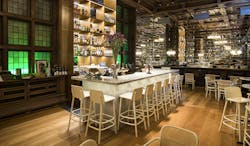
An hotel that is a fusion of the historic and the modern, 4-star, in the centre of Bergen, opposite the Fish Market and with 127 rooms. A cosy and exhilarating atmosphere. Restaurant with Michelin star.
Standard double room
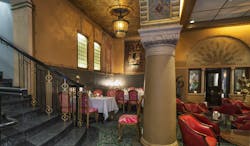
The Hotel Bristol Oslo is a traditional, 4-star, grand hotel in the centre of Oslo a short walk from well-known attractions in the city including Akershus Fortress.
Standard double room
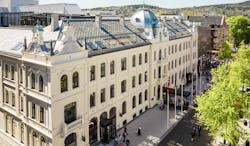
The Britannia Hotel is a traditional, grand, 5-star hotel in the centre of Trondheim, completely refurbished in 2019. Luxurious but discreet rooms, four dining options, bar and wine bar, spa.
Superior double room

The Wood Hotel is an outdoor resort with 177 rooms, just 7 minutes away from the centre of Bodø. Guests can indulge in traditional cuisine with a twist in its restaurant, and the local area provides ample opportunity for exploration.
Standard double room with ocean view
Absolutely loved it. Bespoke sense of the trip is very good. Very pleasant and efficient service.Mrs H, Sep 2023
Holiday price guide From £3,700 per person based on two people sharing a double or twin room and including second class rail travel. Plus class on Norwegian trains at a supplement of £200 per person.
Holiday Code SCFR06
Call us on 01392 441245
Luxury Norway grand rail tour 14 nights including scenic rail journeys
About Oslo and Oslofjord
Norway's capital city, Oslo, nestles at the end of the Oslofjord surrounded by hills and islands. Oslo blends skilfully tradition and modernity. The iconic Oslo Opera House on the waterfront sits a short distance from the Akershus fortress and the Old Town Hall dating from 1641 is a stroll away from the Akrobaten pedestrian bridge, a near-futuristic construction of steel and glass. Much of Oslo is within walking distance from the centre and you can explore happily on foot for much of your stay. You'll notice that cars are very much absent from the centre and that trams are a very easy way of reaching places on the outskirts. A fast train serves the airport and there are numerous ferries from the harbour in front of the town hall that take you to the islands in the fjord and to historic villages along the coast.
Highlights of Oslo
Waterfront, Opera House, Akershus Fortress, Norwegian Resistance Museum, Frogner Park, Bydoy and its museums, Oslo city museum, Fjord cruise
Cultural highlights of Oslo
Munch museum, National museum, Viking Ship Museum, Kon-Tiki Museum, Astrup Fearnley Museum
Festivals of Oslo
Norwegian Wood music festival in June, Oslo World music festival, Christmas, Easter, Oslo Medieval Festival at the end of May, Oslo Chamber Music festival held in August, Oslo Jazz Festival held in August, Holmenkollen ski festival
Gastronomy of Oslo
Seafood of all sorts as well as game
Call us on 01392 441245
Luxury Norway grand rail tour 14 nights including scenic rail journeys
About Vestlandet and Norway's fjordland
Vestlandet contains many of the archetypal sites the visitor associates with Norway: spectacular fjords, colourful fishing ports, stave churches and dramatic panoramas. Vestlandet is a long, thin region in the west of the country, bordering the North Sea and interspersed by jagged inlets from the sea into the mountainous interior: the fjords including Sognefjorden, Geirangerfjord, Lysefjorden, Hardangerfjorden and Eidfjord. Bergen is the outstanding jewel as a town in this region, a World Heritage City, with ancient history, attractive buildings, world-class museums and superb restaurants. Sognefjord is Norway’s longest and deepest fjord and is composed of five large arms with fingers, of which Naeroyfjorden is a UNESCO World Heritage Site. To complement the dramatic natural scenery, there are ample man-made delights in the area too, with charming villages, waterfronts, well-preserved Viking heritage sites and local foodie specialities. You can witness the drama of the Sognefjord by boat from Bergen to Flam on a journey of about five hours. Just north and south of the innermost reaches of the Sognefjord are the outstanding stave churches of Borgund, unchanged since the Middle Ages, and Urnes, the oldest stave church in Norway. The Geirangerfjord is one of the best-known and justifiably so as it contains ten miles of dramatic natural beauty with numerous waterfalls tumbling down the vertical cliff face. The Hardangerfjord runs from the North Sea to the Hardangervidda Plateau and offers a wealth of attractive scenery and pretty towns, with numerous activities. There are also apple orchards and farmland, hiking and cycling. Towards the north of the region is the coastal town of Alesund, whose centre consists mainly of striking Art Nouveau buildings, constructed in the early 20th Century after a fire destroyed most of the old town centre.
Highlights of Vestlandet
Vestlandet is fjord country and the most well-known and spectactular are Sognefjorden, the Geirangerfjord, Lysefjorden, Hardangerfjorden and Eidfjord. The seafaring cities and ports of Bergen and Alesund offer a mixture of cultural, food and sightseeing possibilities. Bergen has the UNESCO World Heritage site of Bryggen with museum, shops, galleries and restaurants. There is the KODE museum of art and design and at Troldhaugen you can visit the home of Edvard Grieg. The region is also home to the Flam railway and cable cars take you to mountain tops. Alesund is renowned as an Art Deco town after a fire in 1904 destroyed the old town. From here it is the gateway to the Geirangerfjord and the Trollstigen mountain road. Combine land and water sports as well as spectacular scenery in Vestlandet. You can also visit glaciers in this region and take the Atlantic Road for coastal vistas.
Cultural highlights of Vestlandet
There is a wide range of cultural visits throughout the region: KUBE art nouveau centre in Alesund, Agatunet traditional Norwegian village on the Hardangerfjord, Kinn stone church from the Middle Ages, Alesund medieval age museum, The Vicarage at Nesset childhood home of Nobel Prize for Literature winner Bjornson, Bergenhus Fortress in Bergen, Suldal living museum farm, Eldhuset at Undredal on the Sognfjord showing local traditions, pasture farming and goat's cheese production, Sirdal mountain musuem, Bergen school museum, Geirganger timber church, Flam railway museum, Steffagarden on Ona croft from 1793, Visnes mining museum, Hardanger fold museum, Baroniet Rosendal manor house and gardens, Viking exhbition at Eidfjord, Vik historical tour, Kaupanger stave church on the Sognefjord, Trollveggen visitor centre, Viking village at Gudvangen, Borgund church, Osteroy museum, Ardal old church Ryfylke.
Festivals of Vestlandet
Kristiansund has a food festival in June, there is a Viking festival in Avaldsnes in June, Sola holds a kite festival in June, Floro holds the world's longest herring table in June, early July sees the Skudefestivalen the largest gathering of coastal culture in western Norway, Floro holds a sea sports festival in mid July, Molde holds the oldest continuously running jazz festival in the world in July, Haugesund harbour days is a yearly tradition in mid August, The Tomato festival is held in mid August at Finnoy on the Ryfylke Islands near Stavanger, Hardanger holds a music festival at the end of August, Bergen has a food festival at the beginning of September.
Gastronomy of Vestlandet
The mild climate and soils of the region lend themselves to the growing of fruit and berries that produce apple juice, cider and jams. Strawberries, raspberries and cherries are also grown locally. Cheeses are produced in the region including the Tingvoll cheese that has been produced here since 1303. Smoked salmon and cured meats are also local. Clipfish (dried salted cod) in the Alsesund area.
Call us on 01392 441245
Luxury Norway grand rail tour 14 nights including scenic rail journeys
About Trondelag
Trøndelag is the region at whose heart sits the city of Trondheim, ancient capital of the kingdom of Norway and a place of pilgrimage in Scandinavia. Trøndelag is north of Vestlandet and hugs the rugged coastline with interiors of coniferous and deciduous forests. Trondheim, once known as Nidaros, is where King Olav Haraldsson was canonised in 1031 and today contains a charming mixture of historic sights and stylish, modern architecture. There are interesting museums (Museum of Art, the Maritime Museum, the Trødelag folk museum and the Museum of Decorative Arts), the warehouses of Bryggen, the royal residence and the Nidarosdomen, Scandinavia’s greatest mediaeval building, built over the grave of Olav the Holy, the patron saint of Norway. Inland is the well-preserved mining town of Røros, with colourful, wooden houses with turf roofs. Since the 17th Century until 1977, the community combined agriculture with copper-mining. At Austrått you’ll find a beautiful white manor house dating from the Viking age, and one of the best-preserved mediaeval buildings in Norway. Just offshore are several islands including Munkholmen, Hitra and Frøya. The latter two are renowned for their deep-sea fishing.
Highlights of Trøndelag
Trondheim, once the Viking capital of Norway, and today Norway’s third city, known as the culinary capital of the country. Scenic attractions of the fjords, the Nidelva River and forests nearby. There is the Bymarka Nature Reserve, the Lade Trail and the island of Munkholmen. In the city itself, historic sites include Nidaros Cathedral, dating from 1070, the Archbishop’s Palace, Stiftsgården, Kristiansten Fortress, Bakklandet old town, and the Trøndelag Folk Museum. Between September and March, you can book an Aurora Borealis (Northern Lights) experience from Trondheim (book at least 48 hours in advance through the Visit Trondheim tourist office).
Cultural highlights of Trøndelag
Trondheim is often the focal point for stays in this area and the ancient city is bursting with cultural activities and sites: Nidaros Cathedral, Trondheim maritime museum, the Armory, the historic wharves, Steinvikholm castle. The Trondheim Symphony Orchestra and Opera give performances. Visit the Sverresborg Trondelag folk museum and the University museum. A short distance from Trondheim by train is the ancient mining town and now UNESCO World Heritage site of Røros. The old mining town is well preserved and the town has strong Sami traditions.
Festivals of Trøndelag
Røros has a 6-day winter fair, summer Olavsfest in Trondheim, Trondheim International Folm Festival, Trøndelag food festival, Jazz festival in May
Gastronomy of Trøndelag
The area is strong on seafood and fish. Hitra crab and Froya scallops are local foods. The region is also known for its cloudberries and reindeer meat. The countryside produces slow-growing vegetables. Must try specialities include crab, langoustine and other shellfish from Hitra and Froya; reindeer, moose and venison; cured meats and homemade flatbread; local baked goods such as lefse, lemse and pjalt; blue cheese and others. The region has many microbreweries and produces local juices.
Call us on 01392 441245
Luxury Norway grand rail tour 14 nights including scenic rail journeys
About Northern Norway
This northernmost region of the country, with the large part of it sitting within the Arctic Circle, is one that conjures up much of the magic for the visitor to Norway. This is the land of snow and ice, endless tundra, red-painted houses of fishing villages, the land of the midnight sun and the eerily mystical Northern Lights. Perched on the coast near Narvik are the idyllic Lofoten Islands, with craggy peaks, inlets and fjords, fishing villages and farms. Svolvaer is the gateway to the Lofoten Islands and from here you can visit the charming villages of Reine, Stramsund, Ballstad and Nusfjord. The main town of the region is Tromsø, situated about 186 miles inside the Arctic Circle and the place from where Amundsen started his polar expedition. The town is a popular place for viewing the Northern Lights. Other places you might visit depending on how you travel through this region are Mo I Rana, Bodø and Narvik. From Narvik you can take the train to Kiruna in Sweden and on to Stockholm (by sleeper train).
Highlights of Northern Norway
Places of interest include the Lofoten Aquarium, the Lofotr Vikingmuseum, farm visits and visits to meet the locals. You can experience the Midnight Sun in summer and undertake many activities such as climbing, hiking, sailing, kayaking, sea safaris to visit Trollfjord and watch for sea eagles, fishing trips. There are scenic routes around the Lofoten Island affording ample photo opportunities and the chance to see striking artwork set amongst the natural landscape and near the viewing points. There are several art galleries on the Lofoten Islands displaying not only paintings and prints, but also glasswork and Lofoten woollen goods. From Bodø there are numerous hiking trails near the hotel, with the hotel recommending the Ramnfloget, Keiservarden, Ørnkloa, Bestefarvarden, and Finnkonnakken. There are also RIB excursions available nearby, and the area is home to the famous Saltstraumen maelstrom. Bodø is a short distance away, with restaurants, bars, shops, and museums, such as the Norwegian Aviation Museum. Mjelle Beach is further up the coast, known for its red sand, infused with garnet. Tromsø recommended highlights: Arctic Cathedral, Storsteinen mountain ledge, Polar Museum, Tromsø Museum, dolphin safaris, fjord cruises, Northern Light searches.
Cultural highlights of Northern Norway
Tromsø is home to a number of museums including the Polar Museum and the Tromsø museum. Svolvaer has its own local history museum and on Lofoten there is a Viking long house and museum. Near Bodø is the Kjerringoy trading post and the Bunkermuseum. Northern Norway is home to the Sami people and you can experience the Sami culture in a number of locations: reindeer herding, joik (Sami folk music), silver working, Sami clothing and ceramics.
Festivals of Northern Norway
Northern Lights festival in Tromsø held at the end of January, the Arctic Arts Festival in Harstad during the summer solstice in June and the Lofoten International Art Festival, which takes place alternate years and features contemporary art. Tromsø holds a jazz festival in the summer.
Gastronomy of Northern Norway
Stockfish is one of the signature dishes (dried cod served with carrots, bacon and scrambled eggs). All manner of fish and seafood: halibut, cod, herring, haddock, mussels, prawns and lobsters. Skrei is the wandering Atlantic cod, and one of the most protected and sustainable fish stocks in the world. Seaweed is harvested in the Lofoten islands and King crab is a delicacy in the region. Herring is served in a variety of ways: fresh, smoked, salted and pickled. Reindeer is a delicacy in northern Norway and is often roasted or cooked in stews. Lamb are reared locally on the Lofoten islands and on the Lyngen peninsula. Cloudberries are picked to make jam and desserts. The Mack brewery is based in Tromsø and produces popular local beers.

